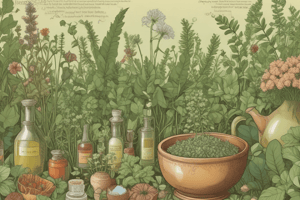Podcast
Questions and Answers
Pharmacognosy focuses on the study of chemical, physical, and biological properties of drugs from natural sources.
Pharmacognosy focuses on the study of chemical, physical, and biological properties of drugs from natural sources.
True (A)
Pharmacology only deals with drugs that are synthesized, not natural ones.
Pharmacology only deals with drugs that are synthesized, not natural ones.
False (B)
Pharmacognosy is derived from the Greek words 'pharmakon' meaning 'food' and 'gnosy' meaning 'wisdom'.
Pharmacognosy is derived from the Greek words 'pharmakon' meaning 'food' and 'gnosy' meaning 'wisdom'.
False (B)
Plants, animals, microorganisms, and fungi are all considered natural sources relevant to pharmacognosy.
Plants, animals, microorganisms, and fungi are all considered natural sources relevant to pharmacognosy.
Taxonomy of plants and the natural sources of drugs are part of pharmacology, not pharmacognosy.
Taxonomy of plants and the natural sources of drugs are part of pharmacology, not pharmacognosy.
The biosynthesis and storage places of active constituents in organisms are not relevant to pharmacognosy.
The biosynthesis and storage places of active constituents in organisms are not relevant to pharmacognosy.
Peppermint is classified as a perennial plant in pharmacognosy.
Peppermint is classified as a perennial plant in pharmacognosy.
Glycosides, Alkaloids, Volatile Oils, and Tannins are examples of active groups found in natural sources studied in pharmacognosy.
Glycosides, Alkaloids, Volatile Oils, and Tannins are examples of active groups found in natural sources studied in pharmacognosy.
Official drugs refer to non-regulated medications from natural sources.
Official drugs refer to non-regulated medications from natural sources.
Pharmacology focuses on the study of chemical, physical, and biological properties of drugs from natural sources.
Pharmacology focuses on the study of chemical, physical, and biological properties of drugs from natural sources.
The term 'Pharmacognosy' is derived from the Greek words 'pharmakon' meaning 'food' and 'gnosy' meaning 'wisdom'.
The term 'Pharmacognosy' is derived from the Greek words 'pharmakon' meaning 'food' and 'gnosy' meaning 'wisdom'.
Peppermint is classified as a perennial plant in pharmacognosy.
Peppermint is classified as a perennial plant in pharmacognosy.
Official drugs refer to non-regulated medications from natural sources.
Official drugs refer to non-regulated medications from natural sources.
Glycosides, Alkaloids, Volatile Oils, and Tannins are examples of active groups found in natural sources studied in pharmacognosy.
Glycosides, Alkaloids, Volatile Oils, and Tannins are examples of active groups found in natural sources studied in pharmacognosy.
Plants, animals, microorganisms, and fungi are all considered natural sources relevant to pharmacognosy.
Plants, animals, microorganisms, and fungi are all considered natural sources relevant to pharmacognosy.
Taxonomy of plants and the natural sources of drugs are part of pharmacology, not pharmacognosy.
Taxonomy of plants and the natural sources of drugs are part of pharmacology, not pharmacognosy.
The biosynthesis and storage places of active constituents in organisms are relevant aspects studied in pharmacognosy.
The biosynthesis and storage places of active constituents in organisms are relevant aspects studied in pharmacognosy.
Pharmacology only deals with drugs that are synthesized, not natural ones.
Pharmacology only deals with drugs that are synthesized, not natural ones.
Flashcards are hidden until you start studying
Study Notes
Pharmacognosy & Pharmacology
- Pharmacognosy is the study of chemical, physical, and biological properties of drugs from natural sources.
- It deals with natural sources such as plants, animals, microorganisms, and fungi.
Definition of Pharmacognosy
- Derived from Greek words "pharmakon" meaning drug or medicine, and "gnosy" meaning knowledge.
Key Concepts in Pharmacognosy
- Taxonomy of plants and natural sources of drugs
- Distribution of natural products in the world
- Description of plants (e.g., Tree, Shrub, Perennial)
- Identification of natural resources
- Active compounds or groups (e.g., Glycosides, Alkaloids, Volatile Oils, Tannins)
Related Concepts
- Biosynthesis within natural resources and storage places of active constituents in organisms
- Used part from natural sources in medicine and pharmacy (e.g., Leaf, Root, Stem)
Pharmacology
- Deals with drugs in general, regardless of whether they are synthesized or natural
- Concerned with pharmacokinetics and pharmacodynamics
Historical Aspects
- Overview of medicinal plant use in different societies
- The role of plants in popular 'non-scientific' medical systems (traditional medicine)
Drugs from Natural Sources
- Crude drug, official, and non-official drugs
Studying That Suits You
Use AI to generate personalized quizzes and flashcards to suit your learning preferences.




